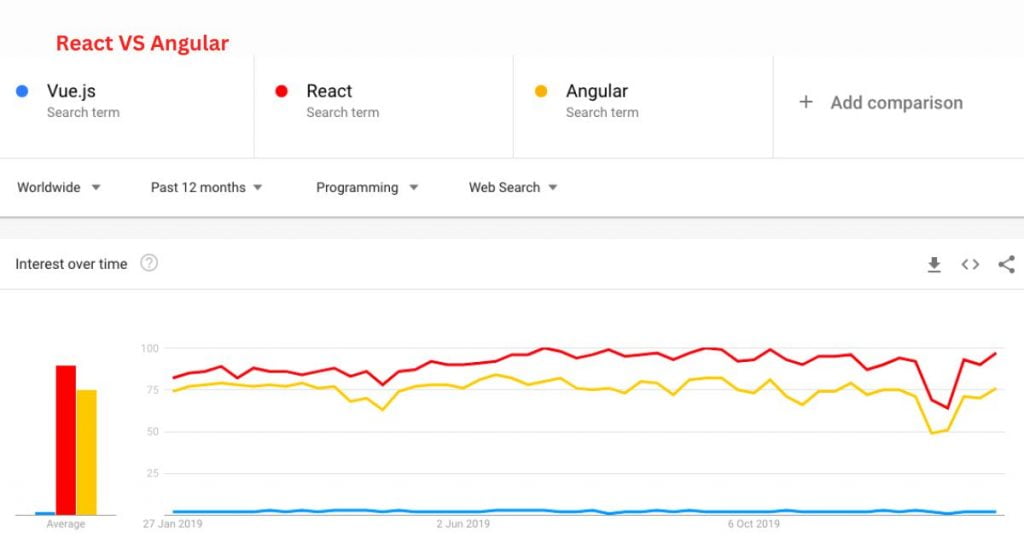When it comes to web development, ReactJs and Angular are two vital frameworks to consider for creating interactive websites. Both React and Angular are powerful frameworks for web developers that can help create stunning user experiences. So which one is right for your project?
Both ReactJs and Angular offer a wide range of features and capabilities for web development. Therefore, it is vital to understand the differences between React and Angular before deciding which one is best suited for your project.
When deciding between Angular and ReactJs development services for web development projects, it all comes down to what you need your application to do. If you’re looking for a library to quickly create simple components, React is the way to go. However, if you need a full-blown framework for complex applications and features, Angular is the better choice.
Also check the list: Top Web App Development Companies
What is AngularJS?
Angular is a JavaScript-based web development framework created and maintained by Google. It helps developers quickly create single-page applications with a dynamic user interface. Angular is an open-source framework, meaning it can be used for free by anyone who wants to use it.
AngularJS is a powerful framework for creating dynamic web applications that provide an intuitive interface. With features like data binding and dependency injection, you can write less code and have your website up in no time. Plus, AngularJS works directly within the browser, allowing it to seamlessly integrate with any server technology of your choice. Put simply: AngularJS makes development faster, easier and more efficient!
Also read: Top Flutter App Development Companies
AngularJS serves as the quintessential language for application-building, something that HTML could have been if it had been specifically designed for this purpose. While HTML makes a great platform for generating static documents, its lack of features and capabilities hinders it when creating web applications.
Users are often left in limbo, trying to figure out how best to trick the browser into doing what they need. AngularJS simplifies this process by providing an effective way forward from traditional development traps.

What is ReactJS?
ReactJS is a powerful JavaScript library created and maintained by Facebook. ReactJs uses a component-based approach that allows developers to create complex user interfaces quickly and efficiently.
React components are easy to reuse, so developers can save time on repetitive tasks. React also helps build scalable projects easier, as the React codebase can easily be updated with new features or bug fixes without having to rewrite the whole application from scratch.
Unlike AngularJS, React does not provide any data binding capabilities. Data binding is important for dynamic web applications as it allows information in one part of the application to automatically update in other parts of the application when changed.
Please check this curated list of top ReactJS Development Companies.
As React doesn’t have this feature built into its framework, developers will need to use an additional library, such as React-Redux, to add data binding capabilities. React also allows developers to use JSX, an XML-like syntax that makes it easier to write React components and add additional features.
Angular Vs. ReactJS
Both ReactJs and Angular development services offer powerful web development frameworks for creating dynamic user interfaces. React is great for quickly building complex components, while Angular provides a complete framework with built-in data-binding capabilities.
The standard features of Angular are
- Angular CLI
- Dependency injection
- Two-way data binding
- TypeScript
- XSS protection
- HTML templates
- CSS encapsulation
The standard features of ReactJS are
- XSS protection
- Virtual DOM, Document object model
- Functional components
- Basis setState management and Context API
Ultimately, the choice of ReactJS or Angular depends on your project’s requirements and what you need from your web application. React is ideal for projects that need to build complex components fast, whereas Angular is best suited for applications that require a robust feature set and full data binding capabilities.
Before proceeding further you can read React Native App Development Companies.
Angular Vs. ReactJS: Main Features at a Glance
- Support: Angular supports Google; ReactJS supports Facebook
- Language: Angular supports TypeScript+HTML; ReactJS supports JavaScript+JSX
- Data flow: Angular uses two-way data binding and one-way data binding with [ ];
- ReactJS uses one-way data binding and two-way-data binding with ReactLink only.
- Technology: Angular uses JavaScript Framework; ReactJS uses JavaScript Library
- Dependency management: Angular uses automatic dependency injections; ReactJS needs additional tools
- Front-end development approach: Angular extends HTML functionality and manipulates read DOM; ReactJS uses hybrid JavaScript and HTML files known as JSX and manipulates virtual DOM.
- Optimal use case: Angular uses enterprise apps where dependency management and consistency are essential; ReactJS uses social media apps, galleries and images, apps that require heavy DOM manipulation.
- Componentization: In Angular, componentization is achieved by template, style, scoping sector and various other properties that make up metadata; In ReactJS, components are conducted by both HTML and JavaScript needed for UI components in a single JSX file.
On the surface, ReactJS and Angular are both based on components and support both types of rendering and data binding. They both have similar performance and unique and different learning curves. You cannot deny that both the technologies’ approaches are different. The main difference between Angular and ReactJS approaches is that in both approaches, application development lies in how they handle state management.
Also Read: React Native VS Swift
Conclusion
Depending on your usage, you can use ReactJS if your views are mainly on visuals and you want to keep creativity and flexibility on top. Also, if you prefer functional unidirectional data flow and functional programming, you must choose ReactJS.
On the other hand, you should use Angular, if you want a stable release cycle, consistency, reactivity, and a uniform way of doing things are at the top of your mind. It is a significant reason why enterprise app development is based on Angular. Not only does it have all the functions of a web app, but best practices across developers are understood, making it easier to get new talent or collaborate remotely.
No matter which route you choose, the experienced team of developers at Capital Numbers can help you get started quickly and efficiently! Their Angular and ReactJs development services are designed to help you build powerful, intuitive user interfaces for web applications that can be quickly deployed.
Want to develop a website? Get in touch with them today!










Leave a Reply